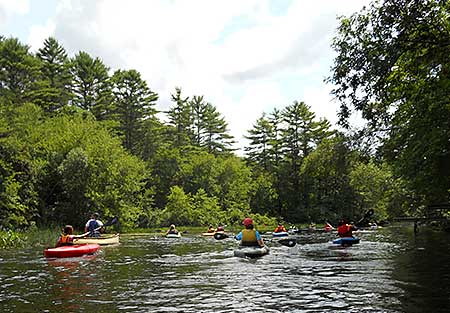Engaging Underserved Urban Youth with the Out-of-Doors through Wood River Explorations
The kids got off the bus and looked around nervously at the flowing river, the trees, and the lack of buildings. After spraying themselves thoroughly with insect repellent, they started asking questions. “Miss, will we go over the waterfall?” “Miss, are there alligators in that water?” “Miss, is something going to bite me?” Some just came right out and said “I’m really scared!” These were kids from Providence, Pawtucket, Central Falls, Woonsocket, and West Warwick who were about to get into a kayak for the first time in their lives. They were taking part in Engaging Underserved Urban Youth with the Out-of-Doors through Wood River Explorations, a summer program put on by WPWA and the Environmental Council of Rhode Island (ECRI). ECRI, who is the local National Wildlife Foundation (NWF) affiliate, proposed the project last winter. NFW has a small grant program for affiliates that, among other goals, seeks to connect children to nature. ECRI was awarded $3,300 to have WPWA teach kids how to kayak on the Wood River.
The WPWA Campus is the ideal location to teach anyone to paddle. Barberville Dam creates a quiet, pond like setting in front of the public launch site at the facility. Within a short paddle upstream the river is full of marsh plants and wildlife. Our fleet of 30 single person 9-foot plastic boats, half of which were donated by Chariho Middle School students, can accommodate large and small groups. Two of our staff are trained in ACA Kayak Instruction Level I, the basics of paddling. With over 15 years of experience taking people out on the water, WPWA can provide a unique and positive experience for even the most timid of beginners.

Kids paddling on the Wood River.
Photo courtesy of the Wood-Pawcatuck Watershed Association
For this program, ECRI and WPWA wanted to target children who would normally not have a chance to learn an outdoor skill like kayaking. Outreach was made to four organizations which provide enrichment programs to urban and/or at risk youth: University of Rhode Island Science and Math Investigative Learning Experience (SMILE); Providence After School Alliance (PASA); Reaching Youth through Service and Education (RYSE); and the Gateways Organization Adventures in Learning Program. Through these organizations we connected with three other partners – Biomes Marine Biology Center, Foster Parrots, and the Roger Williams Park Zoo Education Department; and eight middle and high schools. We also provided paddles for Operation Military Kids (OMK), a group that provides summer activities for children who have at least one parent serving in active duty.
From May to August of 2013 WPWA, hosted 182 children on twelve paddles of the Wood River. The youth organizations provide supervision and transportation to bring them to the WPWA Campus. The youth were given instructions in kayak paddling before being launched into boats for the paddle upstream. Most paddles lasted from 1 to 1 ½ hours. Participants saw painted turtles, great blue herons, osprey, aquatic flowering plants, and numerous damselflies and dragonflies. At appropriate points during the paddle river ecology and qualities of clean water systems were discussed.
This project was an unqualified success. Most of the children attending had rarely been out of the city and never had a chance to engage in an outdoor activity on a clean, natural river. While many arrived with expressions of fear and anxiety they quickly caught on to the basics of paddling. They got to try something very much out of their comfort level and learn a little about the Wood River. The real success of this project is due to the ten volunteers who helped out with the paddles – Jim Cole, Martha Cruciani, Andy Fantoni, Bill Hahn, Elly Heyder, Meg Kerr, Diane Laderoute, Corry Mott, Michael Rinaldi, and Gary Whitney. They made the kids feel at ease, coxing them gently onto the water, then watching them and giving them instructions as needed. One volunteer stood in the cold water (in May) holding onto a young girls boat, and letting her grip his hand, until she felt comfortable enough to start paddling on her own. Other volunteers tow kids who were getting a little too tired and pulled stuck boats off of sandbars. They helped keep the trips organized and safe.
The best question I heard, while we were returning back to the dock, was from a young man who asked “Miss, when do we get to do this again?”
Article reprinted with permission from “The Watershed”, WPWA’s newsletter



